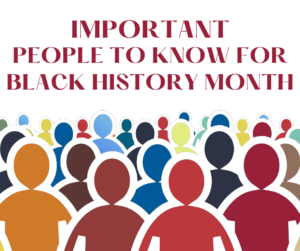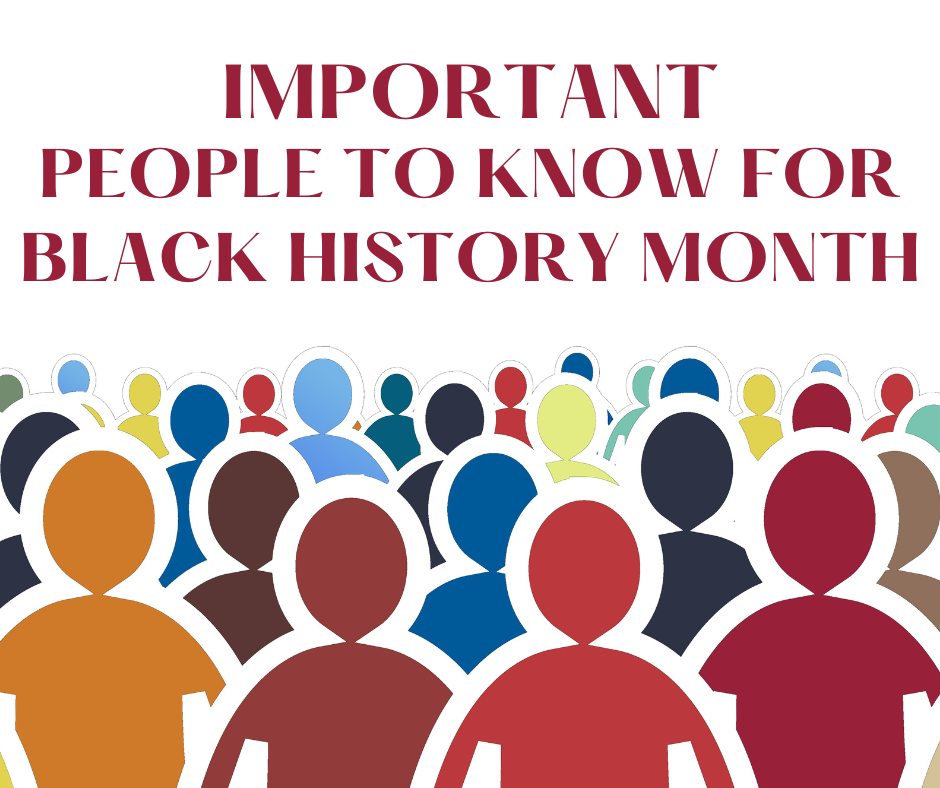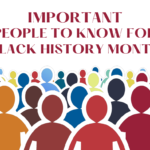Who are some important people you might study for Black History month? In the tapestry of history, there are individuals whose contributions and legacies shine like guiding stars, illuminating the path for generations to come. The African American community, with its rich and diverse cultural tapestry, has gifted the world with a multitude of these luminous figures. From the realms of art and literature to science, politics, and beyond, the annals of history are adorned with the names and stories of remarkable individuals who have left an indelible mark on humanity.

In this blog post, we embark on a journey to explore the lives and achievements of some of the most important African American figures, whose brilliance and determination have shaped the course of history, especially in the United States. From the eloquent words of literary giants to the groundbreaking discoveries of scientific pioneers, we delve into their stories, understanding not only the impact they had on their time but also the enduring inspiration they offer to all of us today.
Join us as we celebrate excellence, honor the invaluable contributions of these individuals, and weave together a tapestry of inspiration, resilience, and innovation that continues to enrich our global community. These individuals are more than historical names; they are beacons of hope, embodiments of culture, and testaments to the boundless potential of the human spirit. We have created biographies for each of these people. These would be excellent lessons for Black History Month or Women’s History Month. We will be adding more in the future so be sure to check back. Also be sure to check out our resource for ideas on activities for Black History Month in the classroom.
Black History Month Biography Resources on My Bilingual Life
Our biography resources are great for teaching at any time of the year but bundle them together for a special unit of study for Hispanic History Month, Black History Month, or Women’s History Month. These can be used in your guided reading groups or as whole class lessons. Our lessons are great supplements to your social studies curriculum and a great way to teach the biography genre. The passages are available in both English and Spanish with formats for online or in-person learning. While the bundle is the most economical format, feel free to pick and choose the language and format that best fits your classroom needs.
Each lesson has a short reading passage about the historical figure. Then there are several activities to practice reading comprehension. There are a few questions that you can have students answer in writing (or use it as a whole class activity), a vocabulary activity with some of the more challenging words in the passage, a sequencing activity with events in the passage, and a writing prompt graphic organizer for pre-writing and a lined writing page. Of course, you can choose which of these activities to do with your students. Depending on your time restraints, you could use this lesson over several days or one longer class period. If you are doing Language of the Day, you could easily switch between the English and the Spanish activities.
Finally, the activities are easy to use and require very little preparation. They are simple enough that you could leave these as lessons to use with a substitute. Finally, one way that I like to use these activities is to have student pairs (or small groups) study different individuals and then report about their person to the class. These are a great launching point for more intensive studies.
Important People You Should Know for Black History Month
Martin Luther King, Jr.
Martin Luther King Jr. stands as an enduring symbol of courage, resilience, and the tireless pursuit of justice. Studying his life and legacy during Black History Month is essential as it offers a profound insight into the Civil Rights Movement and the ongoing struggle for racial equality. Dr. King’s eloquent speeches, most notably his iconic “I Have a Dream” address, resonate across generations, inspiring conversations about the power of nonviolent activism, the importance of solidarity, and the unyielding belief in a more inclusive and just society. His legacy serves as a beacon, encouraging reflection on the progress made and the work that continues, making Martin Luther King Jr. a pivotal figure whose teachings remain profoundly relevant in shaping a more equitable and compassionate future. Our resource featuring Martin Luther King, Jr. is completely FREE so you can see what our biography units are like. Be sure to check out our article about using this resource in your classroom.
W.E.B. Du Bois
W.E.B. Du Bois, a towering intellectual and civil rights pioneer, holds a pivotal place in the tapestry of Black history, making him an essential figure to study during Black History Month. As a sociologist, historian, and co-founder of the NAACP, Du Bois significantly shaped the discourse on race, challenging societal norms and advocating for equality. His groundbreaking concepts like “double consciousness” and advocacy for higher education through the “talented tenth” continue to influence discussions on identity and opportunity. By delving into Du Bois’s writings, students gain not only a historical perspective on the struggle for civil rights but also insights into the complexities of race and social justice. Studying Du Bois fosters critical thinking, awareness, and an appreciation for the profound impact one individual can have on shaping a more inclusive and equitable world.
Tyler Perry
Tyler Perry, a multifaceted creative force in the entertainment industry, emerges as a compelling figure to study during Black History Month. As a filmmaker, playwright, actor, and entrepreneur, Perry has achieved remarkable success, broken down barriers, and reshaped narratives within the predominantly white entertainment landscape. His commitment to telling diverse stories, often centered around the Black experience, challenges stereotypes and contributes to a more inclusive cultural landscape. Perry’s rise from poverty to becoming a media mogul underscores the transformative power of resilience and determination. Studying Tyler Perry during Black History Month offers a contemporary lens through which to explore the impact of Black voices in shaping and diversifying the entertainment world, emphasizing the importance of representation and authenticity in storytelling.
Thurgood Marshall
Thurgood Marshall, a trailblazing legal icon, is a figure of paramount importance to study during Black History Month. As the first African American Supreme Court Justice, Marshall’s groundbreaking achievements extend far beyond his judicial tenure. A brilliant lawyer and tireless advocate for civil rights, he played a pivotal role in landmark cases such as Brown v. Board of Education, dismantling racial segregation in American schools. Marshall’s legacy embodies the relentless pursuit of justice, equality, and the transformative power of the law in challenging systemic racism. By studying Thurgood Marshall during Black History Month, students gain valuable insights into the legal battles that reshaped the fabric of American society, emphasizing the enduring impact of individuals who courageously fought for a more just and equitable nation.
Sojourner Truth
Sojourner Truth, an indomitable force for freedom and equality, is a pivotal figure to study during Black History Month. Born into slavery and later emancipated, Truth became a powerful abolitionist and women’s rights advocate. Her iconic “Ain’t I a Woman?” speech remains a timeless testament to her eloquence and unwavering commitment to justice. Truth’s life is a profound journey of resilience, as she navigated the harsh realities of slavery to emerge as a compelling voice for the marginalized. Studying Sojourner Truth during Black History Month illuminates the intersectionality of race and gender in the fight for civil rights, inspiring reflection on the enduring strength and determination of individuals who forged the path toward a more inclusive and equitable society.
Ruby Bridges
Ruby Bridges, a symbol of courage and resilience, is an important individual to study during Black History Month. In 1960, at the tender age of six, Bridges became the first Black child to desegregate an all-white elementary school in the South. Her journey was marked by adversity and hostility, as she faced discrimination and bigotry with remarkable poise. Bridges’ bravery not only marked a significant moment in the Civil Rights Movement but also served as a catalyst for desegregation efforts across the nation. Studying Ruby Bridges during Black History Month provides a poignant lens through which students can explore the profound impact of individuals, even young ones, in challenging systemic racism and advancing the cause of equality. Her story is a testament to the transformative power of one person’s courage in the face of adversity, inspiring discussions on empathy, resilience, and the ongoing pursuit of justice.
Rosa Parks
Rosa Parks, often hailed as the “Mother of the Civil Rights Movement,” is a pivotal figure to study during Black History Month. In 1955, Parks took a courageous stand for justice when she refused to give up her seat to a white passenger on a bus in Montgomery, Alabama. This act of civil disobedience became a catalyst for the Montgomery Bus Boycott and marked a turning point in the fight against racial segregation. Parks’ quiet strength and steadfast commitment to equality symbolize the collective power of individuals in challenging systemic injustice. By studying Rosa Parks during Black History Month, students delve into the profound impact of ordinary people who, through acts of courage, contributed significantly to the broader struggle for civil rights, fostering discussions on courage, resilience, and the ongoing pursuit of equality for all.
Muhammad Ali
Muhammad Ali, a larger-than-life figure in sports and civil rights, is a compelling individual to study during Black History Month. Beyond his prowess in the boxing ring, Ali became an influential advocate for racial justice and a symbol of resistance during a tumultuous period in American history. His conscientious objection to the Vietnam War and his unapologetic embrace of his identity as a Black Muslim challenged societal norms and sparked important conversations about race, religion, and activism. Studying Muhammad Ali during Black History Month provides a rich exploration of the intersections between sports, politics, and social change. His legacy inspires discussions on individual conviction, resilience, and the enduring impact of athletes as cultural and social influencers in the ongoing fight for equality.
Michael Jordan
Michael Jordan, a global basketball icon, transcends sports to become a cultural symbol of excellence and success. Studying Michael Jordan during Black History Month allows for exploration beyond his athletic achievements, delving into his impact on popular culture, business, and the empowerment of Black athletes. Jordan shattered barriers, becoming the first billionaire athlete, and his success in a predominantly white industry is a testament to his unparalleled skill, work ethic, and business acumen. By studying Jordan, students can appreciate not only his athletic prowess but also the broader implications of his influence on breaking racial barriers in sports and inspiring a generation of aspiring athletes. His legacy extends beyond the basketball court, making him an important figure in discussions about the intersection of race, sports, and entrepreneurship during Black History Month.
Malcolm X
Malcolm X, a magnetic and transformative figure in the Civil Rights Movement, is crucial to study during Black History Month. His journey from a troubled past to a charismatic leader and advocate for Black empowerment is a testament to personal growth and resilience. Malcolm X’s philosophy of self-determination and his unwavering commitment to justice resonated profoundly, challenging the nonviolent approach of the mainstream Civil Rights Movement. His powerful speeches, such as “The Ballot or the Bullet,” continue to inspire discussions on racial identity, systemic injustice, and the pursuit of equality. By studying Malcolm X during Black History Month, students gain insights into the complexities of the fight for civil rights, encouraging thoughtful reflection on the diverse strategies employed in the quest for racial justice and societal transformation.
Louis Armstrong
Louis Armstrong, a jazz pioneer and musical virtuoso, holds a paramount place in the annals of Black history. As one of the most influential figures in the history of American music, Armstrong’s innovations in jazz transformed the genre and had a profound impact on the cultural landscape. His unparalleled talent as a trumpeter, vocalist, and composer not only shaped the course of jazz but also challenged racial barriers, breaking new ground for Black artists in the entertainment industry. Studying Louis Armstrong during Black History Month provides an opportunity to explore the cultural contributions of African Americans and the role of music in fostering social change. Armstrong’s legacy serves as a bridge between artistic expression and the broader struggle for racial equality, inspiring discussions on the transformative power of music in shaping our shared cultural heritage.
Frederick Douglass
Frederick Douglass, a towering figure in American history, is a crucial individual to study during Black History Month. Born into slavery, Douglass defied the oppressive chains of bondage to become a distinguished abolitionist, author, and orator. His eloquent writings, such as his autobiography “Narrative of the Life of Frederick Douglass, an American Slave,” exposed the brutal realities of slavery and became a powerful tool in the fight for emancipation. Douglass’s contributions extended beyond the abolitionist movement; he was a fervent advocate for women’s rights and educational equality. Studying Frederick Douglass during Black History Month allows for a profound exploration of the resilience, intellect, and courage of an individual who played a transformative role in the struggle for freedom and justice, paving the way for a more inclusive and equitable society.
Langston Hughes
Langston Hughes, a luminary of the Harlem Renaissance, stands as a vital figure to study during Black History Month. Renowned for his poetry, essays, and contributions to literature, Hughes used his words to capture the essence of the African American experience in the early 20th century. His works, including “The Negro Speaks of Rivers” and “The Weary Blues,” resonate with a profound sense of identity, pride, and the complexities of racial consciousness. Hughes became a trailblazer, breaking new ground in literary expression and influencing generations of writers. By studying Langston Hughes during Black History Month, students delve into the power of artistic expression as a vehicle for social change, exploring themes of identity, cultural pride, and the enduring quest for equality. Hughes’s legacy encourages thoughtful reflection on the transformative role of literature in shaping our understanding of history and fostering a deeper appreciation for diverse voices.
Jesse Owens
Jesse Owens, a legendary track and field athlete, holds a paramount place in Black history, making him a vital figure to study during Black History Month. Owens defied the racist ideology of Nazi Germany during the 1936 Berlin Olympics by winning four gold medals, showcasing not only his athletic prowess but also challenging the myth of Aryan racial superiority. His achievements became a symbol of triumph over adversity and a powerful statement against racism. Owens’s legacy extends beyond the track, as he paved the way for future Black athletes and played a role in dismantling racial barriers in sports. Studying Jesse Owens during Black History Month provides a compelling lens through which to explore the intersection of sports and social change, highlighting the transformative impact of athletic excellence in the ongoing fight for racial equality.
Jackie Robinson
Jackie Robinson, a trailblazing athlete, is a pivotal figure to study during Black History Month. Breaking the color barrier in Major League Baseball in 1947, Robinson not only showcased extraordinary athletic talent but also became a symbol of courage and resilience in the face of racial prejudice. His integration into professional baseball marked a significant milestone in the broader Civil Rights Movement, challenging segregation and paving the way for future generations of Black athletes. Studying Jackie Robinson during Black History Month provides a profound exploration of the transformative power of sports in dismantling racial barriers. Robinson’s legacy goes beyond the baseball diamond, inspiring discussions on perseverance, breaking barriers, and the ongoing pursuit of equality in sports and society.
Harriet Tubman
Harriet Tubman, a remarkable figure in American history, is an essential individual to study during Black History Month. Born into slavery, Tubman’s courage and determination led her to become one of the most prominent abolitionists and conductors of the Underground Railroad, aiding hundreds of enslaved individuals in their quest for freedom. Often referred to as the “Moses of her people,” Tubman’s heroic acts demonstrate the power of individual action in the fight against oppression. Studying Harriet Tubman during Black History Month provides a poignant exploration of resilience, bravery, and the indomitable spirit that fueled the Underground Railroad. Her legacy inspires conversations about the enduring quest for freedom, the complexities of the abolitionist movement, and the lasting impact of one person’s commitment to justice.
Ella Josephine Baker
Ella Josephine Baker, a lesser-known yet immensely influential figure, is a compelling individual to study during Black History Month. A tireless civil rights activist and organizer, Baker played a pivotal role in several key organizations, including the NAACP and the Southern Christian Leadership Conference. Her commitment to grassroots activism and belief in the power of collective action distinguished her as a leader who empowered communities to advocate for their own rights. Studying Ella Baker during Black History Month sheds light on the often overlooked contributions of women in the Civil Rights Movement and underscores the importance of inclusive, bottom-up approaches to social change. Baker’s legacy encourages discussions on the intersectionality of race and gender, the dynamics of leadership, and the enduring impact of community-based activism in the pursuit of justice and equality.
Clarence Thomas
Clarence Thomas, the second African American to serve on the United States Supreme Court, is a significant figure to study during Black History Month. Known for his conservative jurisprudence, Thomas’s journey from a modest upbringing in the segregated South to the highest court in the land offers insights into the complexities of race, ideology, and the American legal system. Studying Clarence Thomas during Black History Month provides an opportunity to explore diverse perspectives within the African American community and the broader implications of his legal decisions on issues such as affirmative action, civil rights, and the role of the judiciary in shaping the nation’s course. Thomas’s presence on the Supreme Court prompts discussions on the diversity of thought within Black leadership and the evolving landscape of race and justice in America.
Booker T Washington
Booker T. Washington, a prominent educator and advocate for Black empowerment, is a vital figure to study during Black History Month. Born into slavery, Washington became a leading voice in the post-Civil War era, emphasizing practical education and economic self-sufficiency for African Americans. As the founder of the Tuskegee Institute, he played a crucial role in advancing vocational education and uplifting the Black community through skills development. Studying Booker T. Washington during Black History Month provides a nuanced perspective on the strategies employed by leaders during a challenging period in American history. Washington’s philosophy of gradual progress, economic independence, and education as a means of empowerment sparks discussions on different approaches within the struggle for racial equality, offering valuable insights into the diverse paths taken by leaders in shaping the African American experience.
Bessie Coleman
Bessie Coleman, a pioneering aviator, is a trailblazer whose story deserves attention during Black History Month. Born in 1892, Coleman overcame racial and gender barriers to become the first African American woman to hold a pilot’s license. At a time when aviation was dominated by white males, Coleman’s achievements were groundbreaking, inspiring generations of aspiring Black aviators. Studying Bessie Coleman during Black History Month sheds light on her determination, resilience, and the significance of breaking through racial and gender-based constraints. Her legacy contributes to discussions about diversity and inclusion in historically exclusive fields, encouraging reflection on the importance of representation and the limitless potential of individuals who defy societal limitations.
Charles R. Drew
Charles R. Drew, a groundbreaking physician and medical researcher, is a figure of great importance to study during Black History Month. As a pioneer in the field of blood transfusion and storage, Drew made significant contributions that revolutionized medicine. He played a crucial role in developing the first large-scale blood banks during World War II, saving countless lives. Studying Charles R. Drew during Black History Month offers insight into his commitment to advancing medical science and highlights the challenges he faced as an African American in a racially segregated and discriminatory society. Drew’s legacy prompts discussions about the intersection of race and medicine, the importance of diversity in scientific advancements, and the lasting impact of individuals who defy systemic barriers to leave an indelible mark on their field.
Barack Obama
Barack Obama, the 44th President of the United States, is a transformative and historic figure whose legacy makes him a crucial person to study during Black History Month. As the first African American to hold the highest office in the nation, Obama shattered longstanding racial barriers, offering a symbol of hope, progress, and the possibility of achieving the highest echelons of leadership regardless of race. Studying Barack Obama during Black History Month provides a comprehensive understanding of his presidency, policy initiatives, and the challenges he faced. His tenure prompts discussions about the complexities of identity, the evolving landscape of race in American politics, and the enduring significance of breaking through historical racial milestones. Obama’s legacy serves as a beacon, inspiring future generations and fostering conversations about the ongoing pursuit of equality and representation.
Gwendolyn Brooks
Gwendolyn Brooks, a distinguished poet and the first African American to win a Pulitzer Prize, is a literary luminary whose work is essential to study during Black History Month. Brooks’s poetry, marked by its depth, social commentary, and lyricism, captures the nuances of the Black experience in America. Her groundbreaking achievements opened doors for Black writers and enriched the American literary landscape. Studying Gwendolyn Brooks during Black History Month provides an opportunity to delve into the power of words in addressing social issues, racial identity, and the pursuit of justice. Brooks’s legacy sparks conversations about the intersection of art and activism, the importance of diverse voices in literature, and the enduring impact of poetry as a medium for cultural expression and social change.
Maya Angelou
Maya Angelou, a literary giant and influential figure, is a compelling individual to study during Black History Month. Renowned for her poetry, memoirs, and activism, Angelou’s work transcends genres to provide a powerful narrative of the African American experience. Her autobiographical masterpiece, “I Know Why the Caged Bird Sings,” addresses themes of racism, identity, and resilience, offering a poignant reflection on her own life. Studying Maya Angelou during Black History Month not only celebrates her literary contributions but also delves into the complexities of race, womanhood, and the intersectionality of identity. Angelou’s enduring impact prompts discussions on the transformative power of storytelling, the importance of representation in literature, and the role of art in fostering empathy, understanding, and social change.
Rebecca Lee Crumpler
Rebecca Lee Crumpler, a pioneering physician and the first African American woman to earn a medical degree in the United States, is a crucial figure to study during Black History Month. In the face of formidable racial and gender barriers in the 19th century, Crumpler’s achievements mark a significant breakthrough in the history of medicine. Her groundbreaking work, particularly her book “A Book of Medical Discourses,” reflects her dedication to improving healthcare and addressing the medical needs of underserved communities. Studying Rebecca Lee Crumpler during Black History Month sheds light on her determination, resilience, and the importance of breaking barriers in the medical field. Her legacy prompts discussions about diversity in healthcare, the enduring impact of trailblazers, and the ongoing pursuit of equity in the medical profession.
Important Note about this list:
These people are by no means a complete list of important African American people. However, they are the foundation of our Black History Month biographies available on Teachers Pay Teachers. We will be adding more in the future.
More About My Bilingual Life
Here at My Bilingual Life, we want to help you (or your students) become bilingual. You are in the right place if you are studying Spanish or English for yourself, you are a homeschool family looking for bilingual resources, or a classroom teacher in a dual language, immersion, or bilingual school. We have teacher resources available here.
These listening comprehension activities are perfect if you are studying a language by yourself. Therefore, they are simple for beginning students and provide comprehensible input. You can also practice reading fluency with the video transcript. We have suggestions on how you can best use these videos in both English and Spanish. Also included are activities to increase your vocabulary and comprehension.
We have many resources available on Teachers Pay Teachers. Be sure to check them out. For example, we have a series of biographies for Black History Month and Hispanic Heritage Month. We also have animal reading comprehension passages and a variety of vocabulary learning activities. There are also activities available for grammar and word walls.
As always, if we can help in any way, feel free to contact us by leaving a comment below or on our YouTube channel. If there is a particular subject or topic you would like to see, please let us know and we will add it to our content creation list.






